Text
Want A Healthy Heart? These 4 Diets Are A Must-Try
Have you been looking for a diet that’s good for your heart too? Are you confused with such varied information on different diet regimes available on the internet? If yes, then we have got the perfect news for you to clear your thoughts. American Heart Association (AHA) has recently come up with a consolidated list of diets that can significantly reduce several heart-related risks. According to…

View On WordPress
#American Heart Association#american heart association heart health tips#dash diet#foods for heart health#healthy diet for heart#heart disease#heart disease diet#heart health#heart healthy#heart-healthy diet#lacto-ovo vegetarian diet#Mediterranean diet#pescatarian diet#vegetarian diet
1 note
·
View note
Text
I JUST REALISED I DID MY TIMEPLAN QUESTION WRONG💀💀💀💀

#nooo#the first was make a balanced diet for 2 teenagers that are lacto vegetarian#I THOUGHT LACTO VEGETARIAN DID NOT DRINK MILK OR ANYTHING BUT ITS THE OPPOSITE FUCK#💀#I GOT CONFUSED WITH LACTO OVO AND LACTO VEGETARIAN💀😭#brb im gonna go cry#softie rants。°(°.◜ᯅ◝°)°。#😭lacto ovo and lacto vegetarian both drink milk#😭#I WANNA CRY#I TOOK SO LONG TO FIGURE OUT WHAT DISH TO DO THIS AND NOW THE WORLD IS AGAINST ME#😭💀#I FEEL MY SOUL LEAVING
4 notes
·
View notes
Text
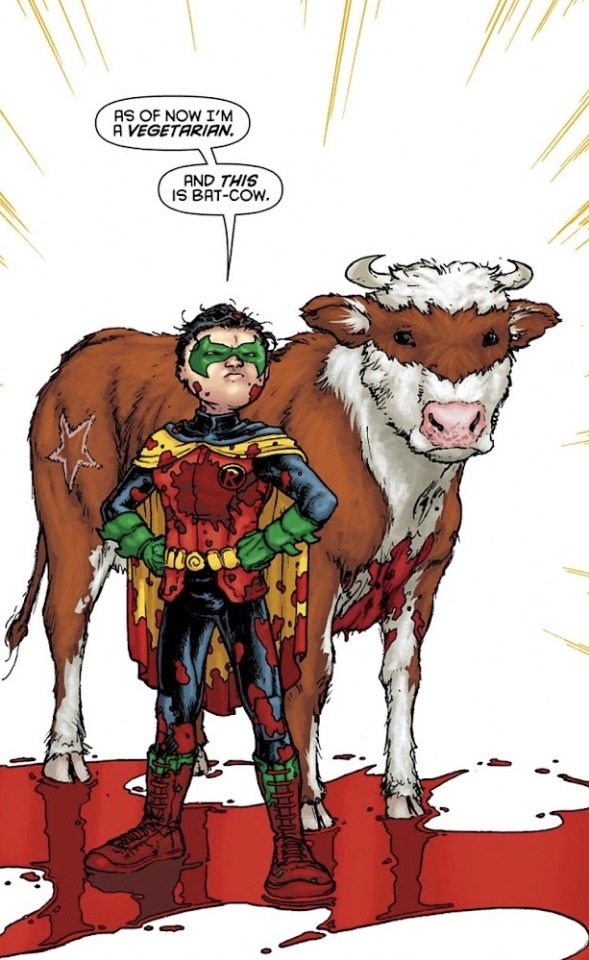
I think we can all agree that Damian has always canonly been a vegetarian. However, there seems to be this misconception that it automatically means he’s vegan. Before getting into the reason why this isn’t the case, let me explain the difference between a vegetarian and vegan.
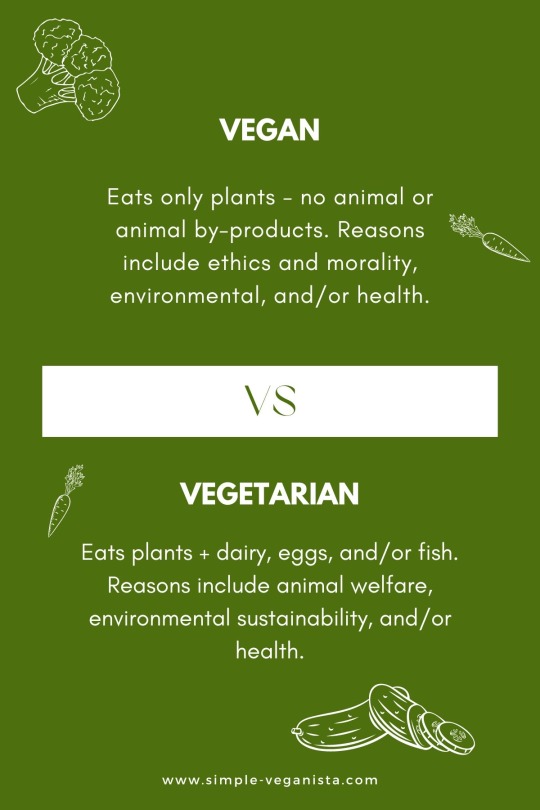
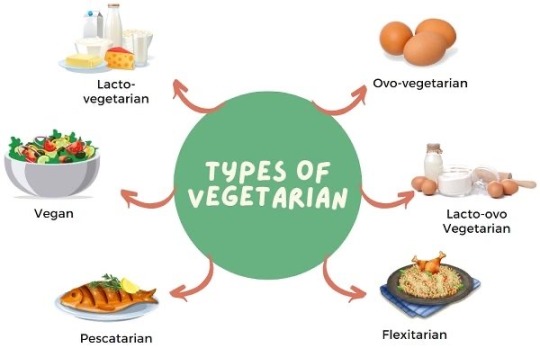
Veganism is a type of vegetarian diet where you abstain yourself from consuming any or from animals. Vegetarian is a broad kind of diet where you avoid meat in general, but can make exceptions to dairy, eggs, fish or insects. There are different types of vegetarians with the most familiar type being Lacto-ovo-Vegetarian.


I could be mean and point out the foods he’s seen eating that could be a vegan or veggie variety. However, I will use evidence that confirms that the products he’s eating or drinking are NOT the vegan variety.

When Branden offers milk to the Kent’s, notice how he says, “I have my own cow.” He’s not saying he doesn’t drink milk. He clarifies he only gets milk from his own cow, Bat Cow.

Considering Bat Cow willingly gives her milk to strangers, this makes sense. Why wouldn’t Bat Cow give Damian her milk?

The next is this. Look what Damian specifically asks for: a glutton free veggie pizza. I decided to look up the ingredients to this kind of pizza and these are the ingredients. Keep in mind these are the ingredients to the pizza Damian specifically ASKS for that cater to his vegetarian diet. So, any ingredients that would NOT apply to the vegan diet do apply.
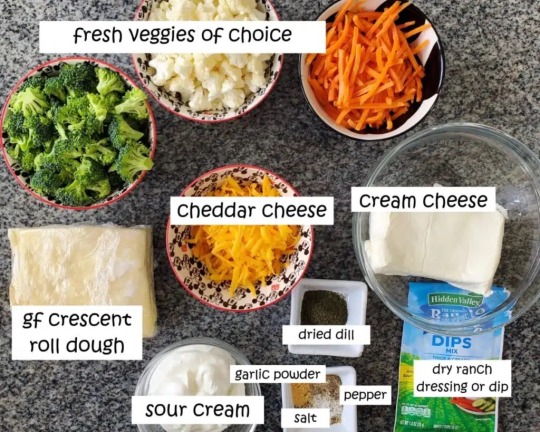
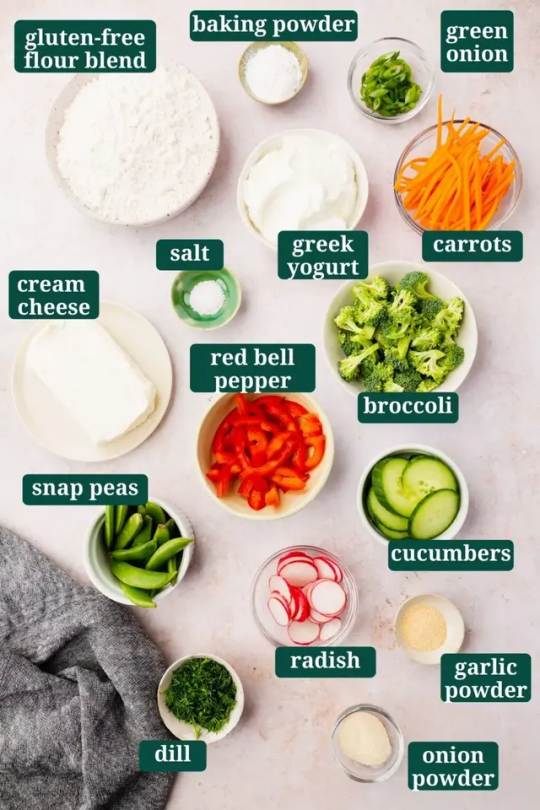
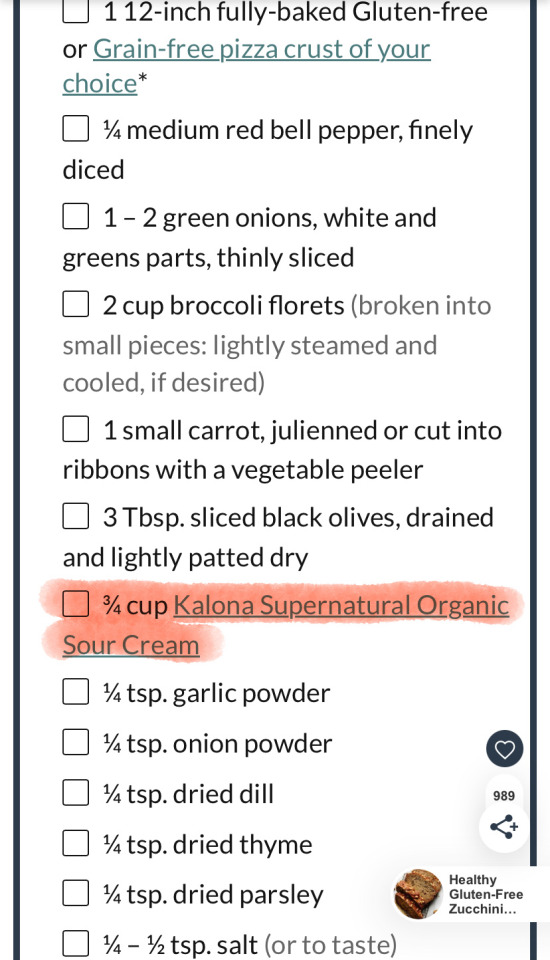
The only vegan part of the pizza that’s called for is the crust. Most of the ingredients calls for diary such as cream cheese and sour cream. Others call for yogurt, ranch and cheddar cheese. This is why pizzas with vegan friendly ingredients are called Vegan Pizzas and not just Veggie Pizza. Why Damian asked for the pizza to be glutton free could be due to possibly being self-conscious about his weight or not wanting his siblings to eat his entire pizza since he’s more restricted than him. Either way, Damian is certainly not ordering a vegan pizza.
Why is this important to Damian’s character to be a vegetarian and not a vegan? It all comes down to Bat Cow. His mortal obligation to became a vegetarian is much more personal than others that become vegans or some form of vegetarian. To understand this, we need to go back to the story that led to Damian’s change in diet.


The illegal slaughterhouse Damian ransacked with his father was an illegal one ran by the Leviathans. The Leviathans placed a target on Damian, being a bounty was set on him at the time. This is what led to the slaughterhouse. This same man, who targeted and almost killed Damian, was about to run off with Bat Cow when Batman and Robin stop him. From then, Damian decided to keep the cow, change his diet and call her Bat Cow.


Both Damian and Bat Cow were both being targeted to be killed when they first met. This is how Damian is able to reach out to Bat Cow. Damian is making this choice with the understanding that Bat Cow will see any human that consumes meat no differently than those that slaughtered her family. By changing his diet, Damian is becoming someone Bat Cow can trust won’t hurt her like in the slaughterhouse.

Understanding this, we can then understand why consuming milk, eggs or dairy doesn’t apply here. This picture is what Damian does not want to be seen as in Bat Cow’s eyes. Nowhere do we see milk, diary or eggs being eaten here. Therefore, eating diary and eggs do not apply to Damian’s diet. So long as those things are freely given and no lives are taken, Damian will not restrict himself from consuming milk, eggs or any eatable products from the animal itself.
Now, I don’t mind Damian being any type of vegetarian that eats/drinks diary from Bat Cow only and eats eggs from Jerry (if female) or Wiggles only. I only have a pet peeve over claiming Damian’s Vegan or a type of Vegetarian that restricts himself from anything his pets willingly give him. The reason is because by restricting Damian as Vegan, it restricts his relationship with Bat Cow, who willingly gives her milk to those who need it. By providing milk for Damian, she’s helping and providing for the one who saved her and gave her a better life.
Most Vegans live in the city where they depend on food from the grocery store. Veganism started around the 20th century when factories and grocery stores began growing and monopolizing their products. However, Vegetarianism has been around for thousands of years. At the time, everyone raised their own livestock. If anyone became a Vegetarian for religious or moral obligations, there was no point in abstaining diary or eggs, being they milked their own milk and gathered their own eggs or else their neighbor’s. There was no concern over how the cows, goats, chickens, quail or turkeys were treated because the Vegetarian was caring and were responsible for their own animals.
If Damian is raising Bat Cow, he has no reason to avoid milk. Same with getting eggs. If Damian gets his eggs from Jerry or the Kent farm, those eggs are not provided through inhuman ways. He might be paranoid enough to only eat foods with dairy ingredients he provides from Bat Cow, but I can’t see Damian completely restricting himself from anything that could be provided to him more humanely. If we truly believe Damian restricts himself to Veganism, aren’t we claiming he can’t get his own milk, cheese, yogurt, etc. from his own cow or eggs from his turkey more humanely? I think Damian would be insulted by us and say…

80 notes
·
View notes
Text
The Gaang’s Favorite Foods
Aang is an ovo-lacto vegetarian. He still consumes milk and eggs, just nothing that requires killing an animal. Being more used to getting nutrients from a variety of plant foods including nuts and seeds, supported by nutrient rich bison milk and whatever eggs they eat in this world, Aang’s diet is surprisingly diverse and not as restrictive as it first seems. People have and still do eat this way. He loves egg tarts!
Sokka is a growing teen boy, used to a high-fat diet of primarily fish, mollusks, large ruminants, marine mammals (and their blubber), full fat milk, eggs, blood, etc, and only minorly supported by additional foods like seaweed, berries, tubers, perhaps the occasional imported flour or rice. He is going to need a LOT of animal meat and fat. Especially organs. The cookbook says he loves dried salmon collars.
Katara is also a growing teen girl, and considering what starts for girls around her age, she probably also has higher iron requirements. Heme-iron (from meat) is the most easily absorbed, and if it’s what her body is accustomed to, I imagine there’s going to be a lot of cravings there too. It’s possible she slowly converted to a vegetarian diet eventually, but there isn’t actually anything in canon to say that Katara and Aang didn’t just maintain different diets. The comics and cookbook say she likes soups and stews including sea prunes which are actually a type of mollusk.
Toph comes from a wealthy family. Although most of the Earth Kingdom relies primarily on staple grains (rice mainly, but also others), she likely had a decently diverse diet compared to others. Including plenty of meat (beef, chicken, duck, pork), a variety of vegetables, and even luxury items like refined sugar. According to the cookbook, she doesn’t like to eat her vegetables, which implies she had open access to meat for most of her life. She is fond of tea eggs.
Zuko comes from the wealthiest nation which is also in a tropical climate. He’d have access to a plethora of fruits the others had never even heard of! Tropical fruits, berries, coconut, and all the different dishes you can make with them. The nutrient-rich volcanic soil would also lend itself to farming, giving this country plenty of fresh vegetables and staple grains. However, culturally they seem to be a meat and seafood loving people, and spiciness is critical! Being a prince, Zuko would have even more access to all of the above than the common person. According to the cookbook, his favorite snack is sizzle-crisps which is basically fried and seasoned pork belly. He also sneaks Komodo-chicken to his uncle in prison.
BONUS:
Azula, like Zuko, is royalty in a nation blessed with great diversity of fruits, meat, seafood, and fresh veggies. We know she attended a harsh military academy which puts its students through rigorous survival training. Azula knows how to live off the land and likely can survive off of whatever petty things she can forage or catch. But being royalty, she is more accustomed to having whatever she desires prepared for her. She seems to have a bit of a sweet tooth, which can happen when you give a teen unfettered access to luxury goods like sugar. With her nation’s relatively advanced stage of industrialization, certain more processed foods and desserts are available to her. She is fond of cherries and in the comics she is a fiend for mochi!
66 notes
·
View notes
Text
Head canons: What’s La Squadras Eating Habits Like?
CW: Food, Sensory issues, Smoking, food cravings, meal skipping
Risotto:
Dietary preference: Omnivore with a preference for red meat, due to his stand he’s always craving iron rich foods
Allergies/ food intolerances: lactose intolerant, mild peanut allergy
Table manners/behaviors: has TMJ so his jaw pops when he eats. He’s kinda embarrassed about it but he doesn’t eat with his mouth open and his table manners are impeccable. So he’s someone I’d gladly eat with 🥺
Favorite taste: savory
Cook, take out, or fast food: he prefers cooking but never has the energy or time for it so he usually opts for street food.
How good of a cook are they (1-5): 3.5 he has some sicilian dishes that he’s perfect at, but other regions he’s just Ok at. Not bad but not great. He can make most things as long as he has a recipe to follow.
Formaggio:
Dietary preference: omnivore, very high carb diet
Allergies/ food intolerances: none! He’s healthy~
Table manners/behaviors: eats way too fast and ends up overeating. He compensates by making singular portions
Favorite taste: Salty
Cook, take out, or fast food: he loves to cook when hes home but when he’s out he indulges on junky fast food 🤤 he could live off of fries and chips/crisps. If it’s deep fried he’s on it. He’d love an American State Fair 🤤
How good of a cook are they (1-5): 5+++ he’s a god tier cook. You ask him for whatever recipe you want he can recreate it. Vincenzo’s Plate, Uncle Roger, and other YT critics got nothing on him. He has a permanent uncle title. BUT…he can’t bake for shit. Don’t even ask him to microwave you a mug cupcake. 🧁 he just can’t. But you’ll get a 5 star 6 course meal that will make your mouth orgasm. His best recipe is his 12 layer lasagna. No he won’t tell you what’s in it, family secret 🤫
Illuso:
Dietary preference: lacto-ovo vegetarian
Allergies/ food intolerances: hes deathly allergic to tree nuts
Table manners/behaviors: talks with his mouth full 😒
Favorite taste: sweet
Cook, take out, or fast food: take out. There’s soooo many reflective surfaces in restaurant kitchens where he can sneak through and just steal a plate of food that he finds appealing and jump back in. 😂 he saves a lot of money on food costs.
How good of a cook are they (1-5): 3.5 cooking wise he’s average. Nothing to write home about. But due to his sweet tooth he’s a god at baking. Choux cream puffs are his specialty. He can make a mean cupcake too his decoration skills are on point 🧁 if you ask him to bake a cake for you, you might be better off buying from an actual bakery. His prices are ridiculously high. But the taste though… it's probably worth every lira
Prosciutto:
Dietary preference: mostly carnivore diet
Allergies/ food intolerances: cruciferous vegetables give him terrible gas pains ☠️ and he’s lactose intolerance (he’s secretly jealous that Pesci can drink milk without getting the shits but he even looks a drop of milk and he’s running to the toilet )
Table manners/behaviors: SMOKES WHILE HE EATS 😡 yuck! this isn’t the 90s bitch. We don’t do smoking sections anymore. He also puts salt on EVERYTHING. If he didn’t smoke so much he’d be able to taste things better 😒
Favorite taste: bitter
Cook, take out, or fast food: cooking if he’s home, if he’s out it’s take out but it has to be from the best of the best! Prosciutto has high standards with his diet and won’t eat any dingy hole in the wall restaurant or some greasy fast food !
How good of a cook are they (1-5): 4 - pretty good cook! Has many recipes he learned from his nonna that he knows by heart. The only issue is he needs to use less salt.
Pesci:
Dietary preference: lacto-ovo pescatarian
Allergies/ food intolerances: has the cilantro gene where it tastes super soapy, also stimulants like coffee and non herbal tea give him an upset stomach 🤢
Table manners/behaviors: his table manners are impeccable. Doesn’t talk with his mouth full, doesn’t slurp, nothing! But he drinks fast and sometimes gets the hiccups 😭 also…he can only drink milk or water- no wine or espresso. It’s not bad table manners but it makes the team look bad (according to Prosciutto 😒 let the boy have his milk dammit )
Favorite taste: sour 🍋
Cook, take out, or fast food: Cook- he likes the rewarding process of fishing for his food, then to process and filet it, and turn it into a dish. Is there really anything more satisfying than that?
How good of a cook are they (1-5): 3- he’s a good cook but he has an issue of overcooking meat since he doesn’t eat it himself other than fish. Don’t ask him for a medium rare steak because it’s either going to be blue rare or very well done. He worries about food safety and food borne illnesses so he always ends up over cooking or burning the meat. His meat dishes may be dry and terrible but at least you know you won’t get salmonella. Fish dishes are obviously his best work. Ask him to make you some sashimi or nigiri sushi some time! It might not be the quality of a Japanese chef but for a home cook he’s pretty damn talented!
Melone:
Dietary preference: highly processed diet
Allergies/ food intolerances: shellfish allergy
Table manners/behaviors: skips meals…needs reminders to eat! Good table manners for the most part but…. He LOUDLY slurps his noodles 😬
Favorite taste: savory
Cook, take out, or fast food: cook and by cooking I mean ready made foods. Ramen noodles, Mac and cheese, frozen microwaveable foods, hamburger helper, -questionable canned foods… he eats like a fucking bachelor. That’s if he even remembers to eat.
How good of a cook are they (1-5): 1.5 can boil pasta and use jar sauce. can use a microwave and that’s about it. He can make cup ramen and throw whatever he finds in the fridge in there and thinks it’s a 5 star meal 😭
Ghiaccio:
Dietary preference: high carb low fat
Allergies/ food intolerances: latex allergy - banana, avocado and kiwi. Has sensory issues so certain textures are intolerable.
Table manners/behaviors: hates when his food touches other foods. WILL NOT EAT IT. Very particular about textures too. If his pasta isn’t al dente he can’t eat it. The mouthfeel is so off it will make him gag. He’d rather eat raw crunchy dried pasta instead of overdone mushy pasta.
Favorite taste: Spicy 🌶️
Cook, take out, or fast food: Take out; he prefers home cooked food but he’s not allowed near a stove. He gravitates towards hot foods when he’s out, like pasta arrabiata, mapo tofu, or Vindaloo.
How good of a cook are they (1-5): -5 this guy could burn cereal. Do not let him in the kitchen. Ever. He’s too literal with following recipes, when they say to turn the stove on high- he puts it on the highest setting and then complains that the recipe is wrong and not him 😬 (same man same 😔)
#jjba#la squadra#jjba part 5#la squadra esecuzioni#jjba risotto#jjba formaggio#jjba illuso#jjba prosciutto#jjba pesci#jjba melone#jjba ghiaccio#jojo risotto#jojo formaggio#jojo illuso#jojo prosciutto#jojo pesci#jojo melone#jojo ghiaccio
27 notes
·
View notes
Note
ok. References: https://www.mdpi.com/2072-6643/14/23/5115
https://www.pcrm.org/news/health-nutrition/vegan-diet-better-environment-mediterranean-diet
https://www.theguardian.com/environment/2023/jul/20/vegan-diet-cuts-environmental-damage-climate-heating-emissions-study
https://www.ethicalconsumer.org/food-drink/shopping-guide/vegan-meat-alterantive-food-brands
Including books like Sustainable Living and 100 Ways to Live Sustainably.
My response under a read more since it got long
First link:
This study is not necessarily advocating for vegan or vegetarian diets, and it mentions that in the introduction. It mentions instead its evaluation of overconsumption of animal products and underconsumption of various plant sources.
The study also mentions that vegans and vegetarians tend to consume more fruits, vegetables, and legumes and in more variety, as well as fewer refined cereals, added fats and sweets, and non-water beverages. This is known as the healthy user bias. The study even mentions that "the differences in terms of health outcomes ... cannot be directly linked only to the different consumption of protein sources." Even their own analysis of various studies find that most results aren't statistically significant, and those that do have significant statistical correlation include flexitarians, pescetarians, and lacto-ovo vegetarians and exclude vegans.

Second link
This article references two different studies, "Environmental Impact of Two Plant-Based, Isocaloric and Isoproteic Diets: The Vegan Diet vs. the Mediterranean Diet" and "A Mediterranean Diet and Low-Fat Vegan Diet to Improve Body Weight and Cardiometabolic Risk Factors: A Randomized, Cross-over Trial."
For the first, this goes into one of my main complaints about dietary sustainability analysis in that the calculations are all hypothetical. It does not study if an individual's personal food choices make an impact on foods being produced. I am not arguing that livestock do not have a significant environmental impact or that agriculture does not damage the Earth. They clearly do. But I'm not a libertarian that thinks the free market will solve the ingrained issues with how food is produced.
My other issue with studies like this is that it groups all livestock together and all crops together. Cattle, chickens, fish, shellfish, goats, etc. all have a very different environmental impact. Almonds, wheat, apples, avocados, beans, rice etc. also all have very different environmental impacts. Painting agriculture with broad brushes like this is, in my opinion, not very helpful. I'm also not interested in pointing out the harmful impact of one side of agriculture while completely supporting the other side and acting like we can ignore that. I am more interested in food raised using sustainable techniques vs. industrially grown food rather than pitting animals and plants against each other as a whole. I am anti-capitalist and I do not make my food and animal activism to still be playing into capitalism. I also dislike pretending that crops and livestock are mutually exclusive industries that do not fundamentally play into each other.
As for the second study, I find this one far more interesting but I do have a few things to point out. The study does not mention what the lifestyles of the participants were before the study began, only that they were overweight. It seems to be operating under the assumption that thinner automatically means healthier, which isn't necessarily the case. But are participants normally eating tons of junk food with little fresh fruits and vegetables and then switching to more balanced diets prepared at home? Considering participants are also specifically asked to avoid sweetened drinks, processed meats and snacks, and cream and to limit cured ham and fatty cheeses, there are almost definitely other factors at play than simply meat vs plants. Second, participants attended classes taught by dieticians and physicians. Of course people would be healthier following instructions by people formally educated in health. Third, it is noted that several participants out of 52 change medications during the study, which can impact results.
Third link
See my points from link 2.
Fourth link
I like the recommendations made for vegan companies here. They suggest making some foods at home and avoiding companies that use palm oil or soy from South America as well as brands like Nestle that are famously known for damaging environments all over the world and harming people especially in poor countries. I will add though that this is harder than it looks due to brands having parents companies and Nestle owns lots and lots of companies. Which also plays into my point that personal choice is so insignificant when up against monsters like Nestle that own so much power.
In short, studies like these can provide some helpful data but they do also miss many important pieces because sustainability and nutrition are such complex topics that do not come with easy answers. I also take all studies with a grain of salt because they are all going to still work under the assumption of a capitalist world. My perspective is anti-capitalist and about an uprooting of our relationship to food and agriculture. Under a capitalist system the best we can do is harm reduction and based on trends of the food market I do not see that vegan diets make a material difference. Rather I promote choices that uplift community food, pressure changes to industry norms including legislative pressure, and socialist activism that benefits people and in turn the animals we live next to. Overproduction and overconsumption are real issues.
I'd like to offer my own studies and references but looking through these has used up all my spoons. My recommendations on books though are Braiding Sweetgrass by Robin Wall Kimmerer and Cows Save The Planet by Judith D. Schwartz.
17 notes
·
View notes
Text
What kind of food do you personally eat/avoid? Could be for ethical, environmental, or religious reasons. If you eat everything in a category but maybe avoid one for health (e.g. egg allergy), choose whatever fits best. If you have a specific religious diet (e.g. Ital), choose what you think fits best and explain in tags. If you are on a “carnivore” diet uhhhhhhhhhhhhh
104 notes
·
View notes
Text
Tomorrow morning at 8am I’m leaving for the silent meditation retreat. While there I will be provided a Lacto-ovo vegetarian diet. I’m actually hoping to use the week to kick-start a healthier lifestyle and eating habits. My goal is under 200.
So here is today’s weight. Let’s see what progress I make over the summer.
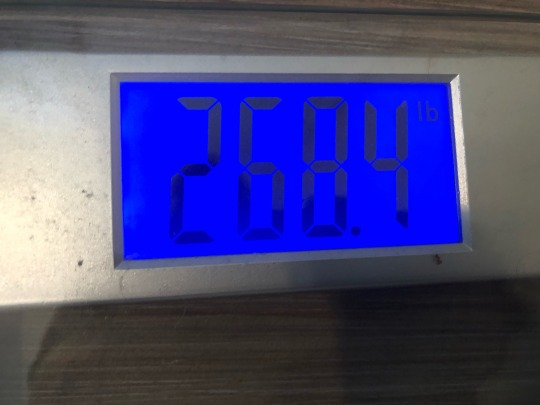
9 notes
·
View notes
Text

Roy doesn’t eat meat or poultry. This diet change started while he served in Ishval, and he keeps it to this day. Occasionally, he will eat fish, particularly salmon or tuna, but he can’t be in the room while it’s being prepared due to the smell or the sound of it cooking. It won’t nauseate him as much as meat and poultry, but it’s better to play it safe. He rarely goes into restaurants for this very reason.
What does he eat then? How does he keep his physique since meat is a big source of protein? Roy did consult with a doctor when he returned home from war—not completely by choice, but he still did. Said physician helped him create a diet that ensures he gets all the nutrients he needs while accounting for his active lifestyle. It can best be described as lacto-ovo vegetarian with very occasional fish.
Is he perfect at keeping his diet? No, definitely not. Especially during the beginning of his time in East City, he both intentionally and unintentionally skipped meals. He got better about it for a while, and he was very selective about the take-out he ordered; all of his orders adhered to his diet. But, once he transferred to Central, he started skipping meals again. Between that, how much he relied on coffee to get him through the day, and his erratic sleep schedule, he lost a fair amount of weight.
Generally, he does not like sharing that he doesn't eat meat. He worries how others will perceive him for it, leading him to keep it to himself save for members of his team.
#components of a fire | headcanon#hc; i wrote my way to revolution | backstory#hc; fuel for the fire | food#hc; he will never be satisfied | personality#nausea tw#diet tw#weight loss tw#unfinished paperwork | queue
0 notes
Text
Exploring Specialty Foods: Kosher, Vegan, Halal, & More

Specialty foods encompass unique, high-quality items tailored to specific dietary needs and preferences or cultural traditions, adhering to strict guidelines in ingredients, preparation, and consumption. As per the Specialty Food Association (SFA), interest in specialty foods has surged, with US sales reaching $207 billion in 2023, an increase of 149% over the decade. Projections suggest sales will hit $221.5 billion in 2024, growing at a 5.4% annual rate through 2027. This trend is reshaping the food industry, expanding product diversity and dining options. Understanding these dietary nuances is crucial in today’s food landscape.
This blog explores four key specialty diets: kosher, halal, vegan, and vegetarian, each influential with unique guidelines and cultural significance.
Understanding Key Specialty Foods: From Kosher to Vegan
In today’s globalized world, the appeal of specialty foods transcends mere sustenance, weaving intricate tapestries of culture, tradition, and identity. Specialty foods, in particular, are celebrated for their unique ingredients, preparation methods, and the stories they tell.
Kosher Foods: Upholding Tradition and Purity
Kosher foods, rooted in Jewish dietary laws (kashrut), emphasize purity and adherence to religious traditions. These laws dictate strict separation of meat and dairy, extending to utensils, based on biblical injunctions. Only certain animals, like cloven-hoofed mammals and fin-scaled fish, are considered kosher, slaughtered humanely in a ritual known as shechita. Recently, kosher cuisine has surged in popularity, with innovations ranging from food trucks to upscale restaurants. Chefs are creatively reinterpreting traditional dishes with modern twists, introducing gourmet challah, kosher sushi, and fusion dishes that blend global flavors while respecting kosher food principles.
For instance, Israel’s widespread demand for kosher foods extends beyond religious communities. This is evident in Israir Airlines’s introduction of vacation packages that feature hotels offering kosher breakfasts.
Halal Foods: A Mark of Faith and Cleanliness
Halal food adheres strictly to halal dietary guidelines, emphasizing ethical treatment of animals and avoidance of certain substances. Permissible animals like cattle, sheep, goats, and chickens are chosen for consumption, slaughtered via dhabihah—a process invoking Allah’s name and ensuring a swift, humane death. Alcohol and intoxicants are strictly prohibited, extending to food preparation. Modern halal offerings include a variety of dishes from burgers to gourmet kebabs, often certified organic and health-focused.
Fusion cuisine blends traditional halal flavors with global culinary trends, introducing innovative dishes like halal Korean BBQ and halal Mexican tacos, enriching the culinary landscape with diversity and flavor. In 2024, KFC Canada’s Muslim division introduced halal menu options at all outlets across Ontario, excluding Thunder Bay and Ottawa.
Exploring Vegetarian and Vegan Diets
Some of the widespread types of vegetarian diets are Ovo-Vegetarian, Lacto-Vegetarian, and Lacto-Ovo Vegetarian.
- Lacto-vegetarian diets include dairy products but exclude meat, poultry, fish, and eggs. Dairy intake provides essential nutrients such as calcium, vitamin D, and protein vital for bone health. - Ovo-Vegetarians consume eggs but avoid meat, poultry, fish, and dairy. Eggs offer high-quality protein, vitamins, and minerals like vitamin B12, crucial for nerve function and red blood cell production. - Lacto-Ovo Vegetarians incorporate dairy products and eggs, except poultry, meat, and fish. This diet ensures a diverse nutrient intake, meeting protein, calcium, vitamin B12, and vitamin D needs without animal meat.
Well-planned vegetarian diets offer significant health benefits, reducing risks of heart disease, hypertension, type 2 diabetes, and certain cancers. Emphasizing fruits, vegetables, whole grains, nuts, and seeds provides essential nutrients like dietary fiber, antioxidants, and phytochemicals, promoting overall health and longevity. However, attention to key nutrients is crucial. Plant-based proteins such as beans, lentils, tofu, and quinoa, along with fortified foods or supplements for vitamin B12 and careful iron and calcium management, ensure nutritional adequacy. The comprehensive vegetarian health benefits extend beyond disease prevention to supporting sustainable weight management and improving overall well-being.
Vegan diets, in contrast to vegetarian diets, exclude all animal products, including dairy, eggs, and honey, driven by ethical concerns for animal welfare and environmental impact. While both diets center on plant-based foods, vegans must meticulously plan to replace nutrients typically sourced from animal products. Vitamin B12, essential for nerve function and red blood cells, requires supplementation as it is absent in plant foods. Non-heme iron from plants is less readily absorbed, necessitating an iron-rich diet paired with vitamin C for absorption. Vegans often obtain calcium and vitamin D from fortified plant milks and sunlight.
Niche Dietary Trends: Understanding Other Specialty Diets
As consumer awareness of health and ethical considerations grows, niche dietary specialties are gaining popularity for their perceived benefits.
The Paleo diet, known as the ‘caveman diet,’ focuses on foods available to early humans: lean meats, fish, fruits, vegetables, nuts, and seeds, while avoiding processed foods, legumes, grains, and dairy. Advocates believe this approach can improve digestion and reduce chronic disease risks.
The Ketogenic (keto) diet is a high-fat, low-carbohydrate plan that aims to induce ketosis, shifting the body’s energy source from glucose to fat. This change is thought to aid weight loss, enhance mental clarity, and boost energy levels by emphasizing meats, fatty fish, eggs, nuts, seeds, and low-carb vegetables while limiting sugars, grains, and most fruits.
The Gluten-free diet, essential for those with celiac disease or gluten sensitivity, has also become popular for improving digestive health and reducing inflammation. It excludes gluten-containing grains like wheat, barley, and rye, opting for alternatives such as rice, quinoa, and corn, along with fruits, vegetables, meats, and dairy.
A plant-based diet focuses on whole, minimally processed plant foods like fruits, vegetables, legumes, nuts, seeds, and whole grains, with occasional inclusion of small amounts of animal products.
Certified Choices: Guide to Specialty Food Labels
Shopping for specialty foods presents both excitement and challenges. It is crucial to navigate the array of specialty food labels and certifications to make informed choices. Kosher certification, denoted by symbols like OU (Orthodox Union) or Kof-K, ensures compliance with Jewish dietary laws. Halal certification, such as from the Islamic Food and Nutrition Council of America (IFANCA), guarantees adherence to Islamic dietary guidelines, emphasizing humane animal treatment and avoiding forbidden substances like pork and alcohol. Vegan certification from organizations like Vegan Action or The Vegan Society, confirms products are free from animal-derived ingredients and not tested on animals.
Avoiding common pitfalls in specialty food shopping is essential for making informed choices. Not all labels are equal; terms like ‘natural’, ‘organic,’ and ‘healthy’ can be misleading without credible certifications like the USDA Organic seal. It is essential for consumers to check for verified labels to ensure authenticity by checking ingredient lists and expiry dates, especially on preservative-free items.
Future of Specialty Foods: Transformative Innovations
Innovations in specialty foods are revolutionizing the culinary world, offering a wealth of diverse and exciting options. Plant-based meat substitutes now closely mimic traditional meat, catering to health-conscious and eco-friendly consumers. Functional foods fortified with probiotics and antioxidants are gaining popularity for their added health benefits, while lab-grown meat, allergen-free alternatives, and novel ingredients from global cuisines are expanding the scope of the specialty food industry. Moreover, eco-friendly packaging and sustainable sourcing practices appeal to environmentally conscious shoppers, making it easier to find high-quality, nutritious, and ethically produced foods that align with various dietary preferences and values.
0 notes
Text
Navigating Vegetarian Diets: Understanding the Diverse Choices

Navigating the realm of vegetarian diets may be both thrilling and scary due to the amount of alternatives. To make informed decisions about your own health and ethical consequences, you should first understand the many types of vegetarian diets. This comprehensive book seeks to clarify the complexities of vegetarianism by investigating its various expressions and its benefits.
A vegetarian diet consists mostly of plant-based foods such fruits, vegetables, grains, nuts, and seeds, with no meat, poultry, or fish. However, vegetarianism offers a variety of nutritional options to suit personal preferences and moral grounds. Beyond just a dietary preference, vegetarianism promotes understanding of food origins and environmental impact.
Switching to a vegetarian diet has been related to a variety of health benefits. According to research, these high-fiber, vitamin- and antioxidant-rich diets can help reduce the risk of chronic illnesses such as diabetes, heart disease, and some malignancies. They can also help reduce cholesterol levels and promote healthy weight management.
There are various different vegetarian diets to select from. Lacto-ovo vegetarianism allows for the eating of dairy and eggs but not animal flesh. Lacto-vegetarianism entails eating dairy products while avoiding all other animal products. Ovo-vegetarianism excludes all animal products, even eggs. Veganism goes a step farther, eliminating all animal products completely. Finally, raw veganism emphasizes eating raw, unadulterated plant-based foods. The macrobiotic diet promotes balance in all aspects of life and contains few animal products.
0 notes
Text
Disadvantages of eating non veg
Introduction
Nowadays most people want to eat non veg for the best health and high protein but they forget how can they get a fit life by killing any life and eating also. They don’t think everyone has a feeling and they also have the right to live their life and they also can enjoy their life without any fear that anyone will kill them why should we do this this makes you a greedy person who thinks only his life, his health, not think that that animal have also there family who waiting for it but people forget that by killing anyone and destroy other life they can’t make them happy they also get affect by this, or if you think eating non veg is good sorry but you are wrong because in non-veg there is lots of harms also like:
Disadvantages of eating non veg food may increase your risk of liver disease:
1. Be cautious if, after viewing Tandoori Chicken with Pea Korma, you can also resist. It can be risky to consume too much non-vegetarian food.
2. overindulging in non-vegetables can worsen digestion. Raises blood pressure.
3. Non-vegetarian diet is frequently the cause of weight gain and cholesterol increases. It is said — and numerous studies have confirmed this — that consuming more non-vegetarian cuisine impairs one’s ability to concentrate. In addition, it makes people angry.
4. It is recommended that those who eat vegetarianism stay with that diet because the liver, intestines, and stomach do not create enough enzymes to break down vegetarianism.
Advantages of eating vegetarian
Is it time to switch to vegetarianism? Vegetarian diets are chosen for a variety of reasons. Eating vegetarianism can help some people lose weight or stay away from hormone-filled meals. For others, eating in this manner is primarily motivated by environmental concerns, animal rights, or religion. If you’re thinking about going vegetarian, you should think about the kind of vegetarian you want to be. After determining which meals to avoid, you should devise a strategy to guarantee that your body receives all the nutrients it requires.
What advantages does a vegetarian diet provide for your health? When adhered to properly, a vegetarian diet has numerous advantages. You’re not going to receive much benefit from this diet if all you eat is processed bread and pasta, plenty of sugar, and very few fruits and vegetables.
1. Beneficial to heart health: If you wish to benefit from the diet’s heart-protective properties, make sure to select: 1. whole grains high in fiber 2. fruits, 3. Vegetables, 4. Nuts, 5. legumes, 6. other low-glycemic foods 2. Lowers cancer risk: Research has shown that a vegan diet lowers cancer risk more than other diets and provides the best protection against cancers unique to women.
It was discovered that the best defense against gastrointestinal tract tumors was provided by a lacto-ovo vegetarian diet.
3. Reduces blood pressure Foods high in plants typically have less fat, salt, and cholesterol, which can help decrease blood pressure. Good potassium amounts are also found in fruits and vegetables, which can help decrease blood pressure. 4. Lessens symptoms of asthma Eliminating some animal items from the diet may lessen allergic or inflammatory reactions, as it is believed that some foods may cause these reactions.
Sources of protein without meat Protein is necessary to maintain a healthy weight and build muscle, as well as to make everything from connective tissue to blood. It is also essential for the synthesis of enzymes and antibodies. When you think of protein, you might automatically think of meat, but there are also excellent plant sources of this vitamin.
Source Amount {in grams}
1 . 1. Greek Yogurt 23 grams
2. Lentils 9 grams 1/2 glass
3. Chia seeds 3 grams 1 tablespoon 4. Quinoa 8 grams 5. Curds 14 grams 1/2 container 6. Hemp Seeds 4 grams 7. Beans (chickpeas, dark beans, and so on.) 8 grams 8. Edamame 5 grams 9. Green Peas 8 grams 10. Nutty spread 7 grams 11. Almonds 6 grams 12. Eggs 6 grams
Eggs are something other than a morning meal sustenance. They once had terrible notoriety for being high in cholesterol yet eating cholesterol doesn’t raise your cholesterol. Don’t simply eat the whites, however. The yolks are additionally supplementing rich, conveying protein, nutrients, and cancer prevention agents.
Saturated fats, which are abundant in meat products, raise the risk of heart disease. According to studies, those who eat non-vegetarian diets have shorter lives and are more susceptible to chronic illnesses. Propensity to develop hypertension, diabetes, and heart problems.
Vegan, Veg, Chicken, eating, Food, non veg
Animals are my friends and I could not harm my friends. I love my friends
1 note
·
View note
Text
The Essential Guide to Vitamin B12: Benefits, Sources, and Q Charge for Optimal Health

Introduction: In the world of nutrition, Vitamin B12 holds a crucial place. It is an essential nutrient that plays a vital role in various bodily functions, including the formation of red blood cells, DNA synthesis, and nerve cell maintenance. This comprehensive guide will delve into the benefits of Vitamin B12, its food sources, the importance of cyanocobalamin, and how Q Charge can optimize your health. Let's explore the fascinating world of Vitamin B12 and discover how it can support your overall well-being. Section 1: Understanding Vitamin B12 Vitamin B12, also known as cobalamin, is a water-soluble vitamin that belongs to the B-complex group. It cannot be produced by the human body and must be obtained through dietary sources or supplements. This vitamin is essential for maintaining healthy nerve cells, DNA synthesis, and the production of red blood cells. It also plays a vital role in converting food into energy, making it essential for overall bodily function. Section 2: Benefits of Vitamin B12 2.1 Energy Boost: Vitamin B12 plays a crucial role in converting carbohydrates into glucose, the body's primary source of energy. Individuals with low levels of B12 may experience fatigue and weakness. By ensuring adequate B12 intake, you can support healthy energy levels and combat sluggishness. 2.2 Nervous System Support: B12 is vital for the maintenance of nerve cells' health. It aids in the production of the protective myelin sheath surrounding nerves, ensuring efficient communication between the brain and other parts of the body. Sufficient B12 intake may help prevent neurological disorders such as peripheral neuropathy. 2.3 Red Blood Cell Formation: B12 promotes the formation of healthy red blood cells by assisting in the synthesis of DNA, the genetic material present in cells. Adequate B12 levels prevent megaloblastic anemia, a condition characterized by the production of large, immature red blood cells. 2.4 Cognitive Function: Studies suggest that Vitamin B12 plays a role in cognitive health, including memory and concentration. Adequate B12 levels are crucial for maintaining optimal brain function, particularly in older adults. Section 3: Food Sources of Vitamin B12 Although Vitamin B12 is primarily found in animal-based foods, it can be challenging for vegetarians and vegans to obtain sufficient levels through diet alone. Here are some excellent sources of Vitamin B12: - Shellfish: Clams, mussels, and oysters are rich in B12. - Fish: Salmon, trout, and sardines are great sources. - Poultry and Meat: Chicken, beef, and liver are high in B12. - Dairy: Milk, cheese, and yogurt provide B12 for lacto-vegetarians. - Eggs: An excellent source of B12 for ovo-vegetarians. - Fortified Foods: Some plant-based foods, such as cereals, soy products, and nutritional yeast, are fortified with B12. Section 4: Introducing Cyanocobalamin 4.1 What is Cyanocobalamin? Cyanocobalamin is the most common and stable form of Vitamin B12 used in dietary supplements and fortified foods. It is easily converted into the active form of Vitamin B12 within the body, making it an efficient choice for supplementation. 4.2 Importance of Cyanocobalamin Cyanocobalamin ensures a reliable source of Vitamin B12, especially for those who have restricted dietary intake or absorption issues. It can provide the necessary B12 support to prevent deficiencies and the associated health risks. Section 5: Maximizing Benefits with Q Charge Q Charge is a revolutionary health supplement that combines the power of Vitamin B12 and other essential nutrients. By incorporating Q Charge into your routine, you can enhance the benefits of Vitamin B12: 5.1 Increased Absorption: Q Charge utilizes advanced delivery mechanisms to optimize nutrient absorption. This means that the Vitamin B12 in Q Charge is more easily absorbed by the body, ensuring maximum effectiveness. 5.2 Synergistic Formulation: Q Charge is formulated with a blend of essential nutrients that work together to promote overall health. It combines Vitamin B12 with other key vitamins, minerals, and antioxidants to provide comprehensive support for energy, immunity, and mental clarity. Conclusion: Vitamin B12 is a vital nutrient with numerous benefits for overall health and well-being. By incorporating B12-rich foods into your diet and considering supplementation with products like Q Charge, you can ensure optimal B12 levels and experience the benefits firsthand. Remember, maintaining adequate B12 intake is crucial for energy, nerve function, red blood cell production, and cognitive health. Take charge of your health by prioritizing Vitamin B12 today. Tags for WordPress: - Vitamin B12 benefits - Cyanocobalamin supplementation - Q Charge for energy and immunity - Vitamin B12 food source Boost your energy and strengthen your immune system with our premium B12 and D3 supplements. Unlock vitality and support overall well-being. For more, visit the 'Q Charge' website. Visit the Q Charge Prostate Product Page. Read the full article
0 notes
Text
Discovering Lacto Ovo Vegetarian Protein Sources
Uncover the best lacto ovo vegetarian protein sources for a well rounded diet Explore plant based options that pack a punch
0 notes
Text
Can Vegetarians Eat Yogurt? Ultimate Vegans Yogurt Guide

As a vegan, I understand the importance of carefully choosing our foods. So, I decided to research and find out if yogurt is a viable option for those who follow a vegan diet. In this essay, I’ll explore the ingredients and production methods used in yogurt-making, the different types of veganism, and their dietary guidelines. Join me as we unravel the debate and discover the truth about whether or not vegans can eat yogurt. Let’s dive!
Well, my friend, it’s a lifestyle choice that comes in different types. We have Lacto-vegetarians, ovo-vegetarians, lacto-ovo vegetarians, and even vegans. Each type has its own set of dietary guidelines and restrictions, but all share the common ground of avoiding meat.
Before we dive into the yogurt dilemma, let’s understand the vegetarian perspective. Vegetarians, unlike us vegans, choose to exclude meat from their diet but may still include dairy products and eggs. It’s a personal choice, and I respect that. They find solace in the fact that their diet doesn’t involve the loss of animal lives. But as a vegan, I strive to go a step further and avoid all forms of animal exploitation.
When I first transitioned to a vegan lifestyle, I knew I was saying goodbye to meat, dairy, and all things animal-related. But there was one thing that kept tempting me: yogurt. Oh, that creamy goodness with its countless flavors and textures! Resisting was hard, but I knew I had to stay true to my vegan values.
Now, why do we choose to embrace this herbivorous path? Well, there are plenty of reasons, from animal welfare to environmental concerns and personal health.
For those who choose the Lacto-Ovo Vegetarian diet, dairy often holds a special place in their hearts and their diets. It provides them with essential nutrients like calcium and protein. Yogurt, with its probiotics and creamy texture, becomes a go-to choice. Vegetarians appreciate the versatility and taste of yogurt, and it fits seamlessly into their dairy-friendly lifestyle. But as a vegan, I find other ways to fulfill my nutritional needs without compromising my commitment to animal welfare.
Yogurt is a dairy product made by fermenting milk with live bacteria cultures. The milk is heated to kill off any harmful bacteria and then cooled to a specific temperature. Next, a starter culture of friendly bacteria, such as Lactobacillus bulgaricus and Streptococcus thermophilus, is added to the milk. These bacteria ferment the lactose in the milk, turning it into lactic acid, giving yogurt its tangy flavor. This fermentation process also thickens the mixture. Finally, the yogurt is cooled, flavored if desired, and packed into containers, ready to be enjoyed. Let’s talk about common additives and potential animal-derived ingredients that might find their way into yogurt.
Gelatin
Some yogurts contain gelatin, a protein derived from animal bones, skin, and connective tissue and used as a thickening agent to create that smooth and creamy texture.
Carmine
Some yogurt brands may include additives like carmine derived from crushed insects to enhance the color.
Animal rennet
It’s essential to be mindful of the presence of animal rennet in certain yogurt brands. Rennet, derived from the stomach lining of young calves, is used in some yogurt production processes to curdle the milk and aid in its thickening.
Yogurt, being a derivative of milk, has a strong connection to the dairy industry. The production and consumption of traditional yogurt contribute to the demand for cow’s milk, perpetuating the cycle of animal exploitation. By avoiding dairy, we aim to break free from supporting an industry that raises concerns about animal welfare, environmental impact, and sustainability. It’s about aligning our choices with our values and finding ethical alternatives that allow us to enjoy the pleasures of yogurt without compromising our principles.
Animal welfare is a central concern in the vegan diet. Cows used for milk production often endure a cycle of continuous pregnancies, separation from their calves shortly after birth, and being subjected to milking machines multiple times a day. These practices can be physically and emotionally distressing for these sentient beings. As vegans, we advocate for the compassionate treatment of all animals and strive to support industries prioritizing their well-being. Choosing plant-based yogurts allows us to enjoy a delicious treat while knowing that no animals have been exploited in the process.
0 notes
Text
Embrace the Delightful World of Vegetarian Meal Plans in Dubai and Abu Dhabi
Choosing a vegetarian lifestyle offers numerous benefits, including improved health, reduced environmental impact, and compassion towards animals. In cities like Dubai and Abu Dhabi, where culinary diversity thrives, finding the right vegetarian meal options can be both exciting and challenging. Thankfully, with the availability of vegetarian meal plans, following a vegetarian diet has become more accessible and convenient. In this article, we will explore the advantages of vegetarian meal plans in Dubai and Abu Dhabi, and how they can help you savor the joys of a plant-based lifestyle.
Vegetarian Meal Plans in Dubai and Abu Dhabi
Vegetarian meal plans provide a hassle-free approach to incorporating plant-based meals into your daily routine. These plans offer pre-designed menus that are specifically crafted to meet the nutritional needs of individuals following a vegetarian diet. Whether you are a vegetarian looking to diversify your meals or someone interested in exploring the benefits of a plant-based lifestyle, vegetarian meal plans in Dubai and Abu Dhabi can cater to your dietary preferences and requirements.
Variety and Nutritional Balance
One common misconception about vegetarian diets is that they lack variety and essential nutrients. However, vegetarian meal plans in Dubai and Abu Dhabi prove this notion wrong. These plans are meticulously designed to ensure a wide variety of delicious and nutritionally balanced meals. They incorporate an abundance of fruits, vegetables, legumes, whole grains, nuts, and seeds, providing a rich array of vitamins, minerals, fiber, and plant-based proteins. With a diverse menu that changes regularly, you can enjoy exciting flavors, textures, and ingredients, making every meal a delightful experience.
Convenience of Vegan Meal Delivery
Dubai and Abu Dhabi are bustling cities where time is often a limited resource. Finding the time and energy to plan, shop for, and cook vegetarian meals can be a challenge. Vegan meal delivery services in Dubai and Abu Dhabi provide a convenient solution. These services deliver freshly prepared, plant-based meals straight to your doorstep, saving you valuable time and effort. By eliminating the need for grocery shopping, meal preparation, and cooking, vegan meal delivery services make it easier than ever to adhere to a vegetarian lifestyle without sacrificing convenience.
Customized Meal Plans
Vegetarian meal plans in Dubai and Abu Dhabi offer customization options to cater to individual dietary preferences and requirements. Whether you follow a specific type of vegetarian diet, such as vegan, lacto-vegetarian, or ovo-vegetarian, or have any food allergies or intolerances, you can find a meal plan that suits your needs. These customizable options allow you to personalize your meals while ensuring they align with your nutritional goals and taste preferences. With the flexibility to tailor your vegetarian meal plan, you can embark on your plant-based journey with confidence.
Supporting a Sustainable Lifestyle
Choosing a vegetarian diet is not only beneficial for personal health but also for the environment. Plant-based diets have a lower carbon footprint and contribute to reducing greenhouse gas emissions. By opting for vegetarian meal plans in Abu Dhabi and Dubai, you actively participate in creating a more sustainable future. These meal plans emphasize locally sourced ingredients, seasonal produce, and eco-friendly packaging, further promoting sustainable practices and reducing the impact on the planet. Vegan meal plans in Dubai and Abu Dhabi offer a gateway to a vibrant world of plant-based cuisine. With their variety, nutritional balance, convenience, and customization options, they make embracing a vegetarian lifestyle more accessible than ever. By opting for vegetarian meal plans, you can enjoy the benefits of a plant-based diet while savoring a diverse array of delicious meals. Embrace the joys of a vegetarian lifestyle in Dubai and Abu Dhabi, and let the convenience of vegetarian meal plans guide you towards a healthier, more sustainable, and compassionate way of living.
#Vegetarian Meal Plans in Dubai#Vegan Meal Delivery#vegetarian meal plans in Abu Dhabi#Vegan meal plans in Dubai
0 notes